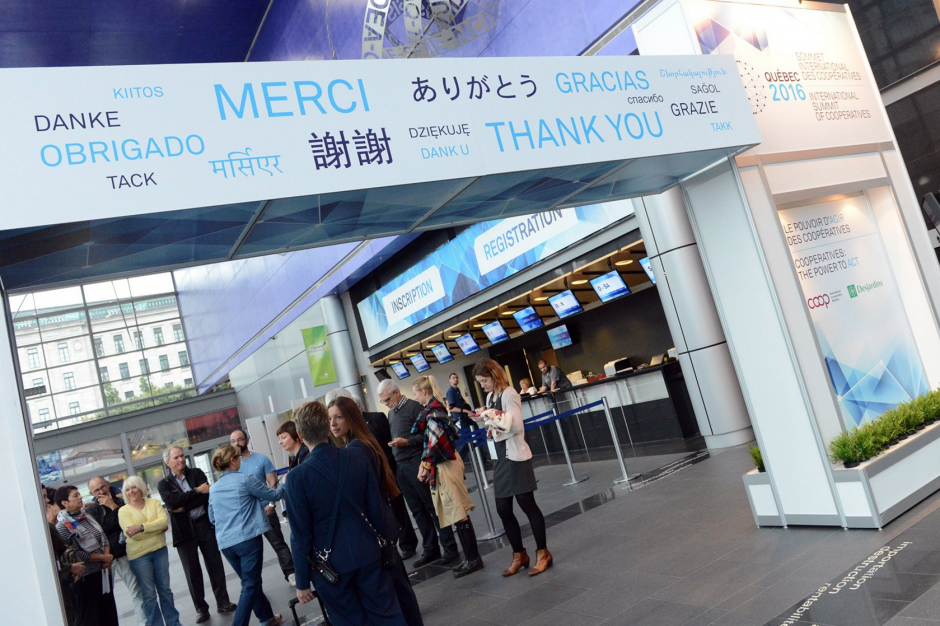The role of co-operative apex organisations is to unite, promote and develop co-ops, said Monique Leroux, president of the International Co-operative Alliance. Ms Leroux was speaking at an event in the lead-up to the International Summit of Cooperatives in Quebec.
During a special pre-summit activity, delegates from co-operative bodies across the world gathered to explore methods through which their organisations could become more efficient.
Nick Matthews, chair of Co-operatives UK, said that umbrella organisations needed to have quality data and a modern communication campaign, making the most of digital. Previously known as the Co-operative Union, Co-operatives UK has been representing the country’s co-ops since 1870.
Coop Fr in France has also got a long history. The organisation was set up in 1968 and has grown to include co-ops from multiple sectors. President Jean-Louis Bancel explained that while data was vital, telling stories about new forms of co-operation was also important.
Other co-operative apex bodies are in comparison rather new. Australia’s Business Council of Cooperatives and Mutuals (BCCM) was set up only three years ago. Andrew Crane, chair of BCCM explained that the role of the organisation was to create a national voice for the sector and educate people about the value and diversity of co-ops and mutuals. “Governments are now starting to listen to us,” he said. Mr Crane also argued that statistics played a key in making the case for co-ops.
In Canada, the country hosting the Summit, the francophone and anglophone co-operative movements came together in 2014 to create a single national organisation – Co-operatives and Mutuals Canada. Executive director Denyse Guy said a key challenge for the body was to pull together data from three different sources. Data on non-financial co-ops is provided by the government while data on financial co-ops comes from the individual organisations themselves. The data from the government tends to lag behind, while financial data is more up to date.

Paulo Jorge Teixeira, president of Portugal’s Cooperativa do Povo Portuense, described some of the challenges faced by co-op bodies in his country, such as an ageing membership. He highlighted that co-ops needed to engage with members and the public via social media, particularly as a means to converse with millennials. He also suggested developing a project similar to the Erasmus exchange programme, to enable young people to learn more about co-operative movements in different countries.
Another question raised at the event was around who takes responsibility for carrying out studies on the size of the co-op sector in different states. “Who owns this task?” asked Melina Morrison, chief executive of the Australian co-op council BCCM.
“Does it come back to the co-op movement itself or do governments have a role too? We have no government data gathering for co-ops and mutuals in Australia. So who owns it?”
Denyse Guy proposed that different apex bodies pool their resources to collectively invest in software to use data in an effective way. The availability of data also encourages academics to research co-ops, which helps to promote the movement, she said.

Mr Matthews added: “The numbers give you the legitimacy but you can’t survive on that. One of the things Co-operatives UK is trying is open data – getting people to use data and improve quality by using it.
“Storytelling is crucial. Big numbers impress politicians; local stories impress people.”
But we don’t just have our own stories, said Andrew Crane. “We need to be able to tell each other’s stories as well.”
Speaking about his experience in Portugal, Mr Teixeira said: “We share all the information and mapping we do because it’s the best way of trying to create co-ops with the same model. Also, when data is sent to other people, they can often spot mistakes you didn’t spot.”
Data also has a role in the recruitment of new member co-ops, explained Andrew Crane, adding that BCCM’s membership has increased by 30%.
“There needs to be a vertical integration of approaches and method at national and international level,” said Melina Morrison, adding that the International Co-operative Alliance could be the driving force of a project to bring uniformed methodology to apex bodies.
In a second session, other panellists looked at what umbrella organisations could to ensure longevity and membership.
Dolly Goh, chief executive of the Singapore National Federation of Co-operatives (SNCF), shared information on how her organisation was working with members to determine future programmes.
“What is very important for us is not to assume what our members need,” she said. “We involve our members in a strategic plan and find out what they need – we involve the young people as well to help define what they see as the future of co-ops and what they like. Then we come up with a blueprint and try to deliver as much as we can on this.”
Related … Finding your voice: how the Co-op Group is giving members say
The organisation also conducts customer satisfaction surveys every year and provides a “match making” service, bringing together co-ops from different sectors that are interested in doing business together.
SNCF is funded through a co-operative fund set up by the government. The tax paid by co-ops goes to the fund, which then gets used to support the movement. Small co-ops pay on 5% tax on profit made, while larger ones pay 20%. Corporation tax is 17% in Singapore. “What is important is that we practise what we preach. Bigger co-ops should help smaller ones and when they get bigger, they will help others,” she explained.
Similarly, in Italy, co-ops contribute to a fund that gets used to finance projects related to the promotion of co-operatives.
Referring to Unimed’s experience in Brazil, the organisation’s president, Eudes de Freitas Aquino, said that secondary co-ops should try to implement the same management model everywhere to ensure the success of their members.
Jean-Claude Seys, vice president of the French mutual insurance body Covéa, added that apex bodies needed to provide governance responses customised according to the different sectors of activity and the existing legal framework.
Dolly Goh believes that in terms of working together, there needs to be more co-operation among co-operative apex bodies. “We don’t have to wait every two years to share our ideas and experiences,” she said.
“Many of us have implemented technology – but why should we start trying to do things ourselves from scratch? We could adopt technology that other co-op somewhere else has. Co-ops limit themselves to borders sometimes.”
- For more of our coverage of the International Summit of Co-operatives, visit thenews.coop/summit.